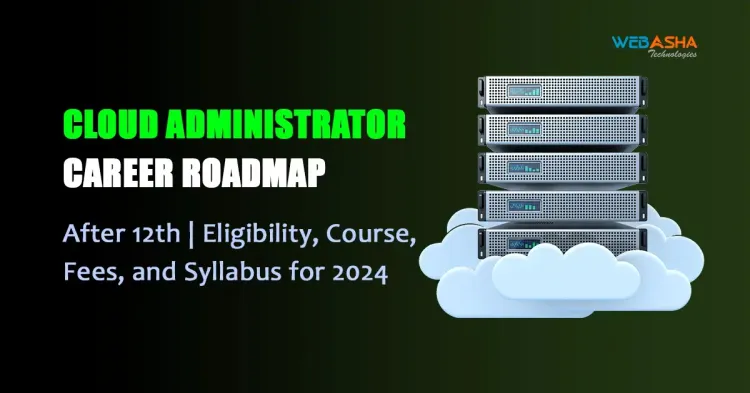How to Choose Cloud Administrator as a Career After 12th?
Choosing a career as a Cloud Administrator after 12th involves several strategic steps:
1. Understand the Role:
Familiarize yourself with the responsibilities of a Cloud Administrator, including managing cloud infrastructure, ensuring security, optimizing performance, and troubleshooting issues on platforms like AWS, Azure, and Google Cloud.
2. Assess Your Interest and Skills:
Evaluate your interest in cloud computing, system administration, and IT infrastructure. A strong foundation in networking, operating systems, and virtualization is beneficial.
3. Gain Relevant Certifications:
Obtain industry-recognized certifications such as:
AWS Certified Solutions Architect
Microsoft Certified: Azure Administrator Associate
Google Cloud Certified - Associate Cloud Engineer
These certifications validate your skills and make you a competitive candidate.
4. Hands-On Experience:
Gain practical experience by working on cloud-based projects during or after 12th. You can use free tiers of cloud platforms to build, deploy, and manage virtual environments.
5. Internships and Entry-Level Positions:
Seek internships or entry-level positions in IT departments or cloud service providers. Real-world experience will deepen your understanding of cloud environments and enhance your resume.
6. Continuous Learning:
Cloud technology is constantly evolving. Stay updated by taking advanced courses, attending webinars, and participating in cloud computing communities.
7. Network with Professionals:
Join cloud computing forums, attend industry events, and connect with professionals on platforms like LinkedIn. Networking can lead to job opportunities and mentorship.
8. Tailor Your Resume:
relevant coursework, certifications, and any hands-on cloud experience on your resume. Tailor it to emphasize your readiness for a Cloud Administrator role.
9. Prepare for Interviews:
Practice answering technical and behavioral questions related to cloud administration. Be ready to discuss your practical experience and how you can contribute to a potential employer's cloud strategy.
10. Choose the Right Employer:
Look for companies that offer growth opportunities in cloud computing. Employers who invest in ongoing training and development can help you advance your career.
Eligibility Criteria
To pursue a career as a Cloud Administrator after the 12th grade, you typically need to meet the following eligibility requirements:
| Eligibility Criteria |
Details |
| Educational Qualification |
Completion of 12th grade (or equivalent) from a recognized board. Students from a science background with knowledge of computer science are preferred. |
| Technical Aptitude |
Basic understanding of computer systems, networking, and the internet. Familiarity with operating systems and basic coding is advantageous. |
| English Proficiency |
Strong command of English is required for understanding technical documentation and communication in a global environment. |
| Certifications (Optional) |
Pursuing introductory cloud certifications (such as AWS Cloud Practitioner or Microsoft Azure Fundamentals) after 12th can enhance your profile. |
Why Choose WebAsha Technologies?
Industry-Recognized Training: WebAsha Technologies offers courses that are designed in alignment with industry standards, ensuring that you gain relevant and up-to-date knowledge and skills in cloud administration and other IT fields.
Experienced Instructors: Learn from seasoned professionals who bring real-world experience to the classroom. Their expertise helps bridge the gap between theory and practical application.
Comprehensive Course Offerings: WebAsha provides a wide range of courses, from beginner to advanced levels, covering all aspects of cloud administration, including AWS, Azure, and Google Cloud Platform.
Hands-On Learning: The training programs at WebAsha emphasize practical, hands-on experience. You’ll work on live projects and simulations that prepare you for real-world challenges.
Flexible Learning Modes: WebAsha Technologies offers both online and offline training options, allowing you to choose a mode that fits your schedule and learning preferences.
Certification Support: The institute provides guidance and support for obtaining industry-recognized certifications, enhancing your employability and career prospects.
Career Assistance: WebAsha offers career counseling, resume building, and placement assistance to help you secure a job in cloud administration or related fields.
Affordable Fees: The courses are competitively priced, offering value for money with a strong focus on quality education.
Community and Networking: By joining WebAsha, you become part of a community of learners and professionals, providing networking opportunities that can be valuable throughout your career.
Proven Track Record: With a history of successful alumni and positive feedback, WebAsha Technologies has established itself as a trusted name in IT training and education.
Choosing WebAsha Technologies ensures that you receive a well-rounded education that equips you with the skills and knowledge needed to excel in your cloud administration career
Mode of Training at WebAsha Technologies
Online Training:
Flexibility: Access course materials, lectures, and resources from anywhere, anytime.
Interactive Sessions: Participate in live virtual classes with real-time interaction with instructors.
Recorded Lectures: Review recorded sessions at your convenience.
Virtual Labs: Gain hands-on experience through cloud-based labs and simulations.
Classroom Training:
In-Person Instruction: Attend classes at WebAsha’s physical locations with direct interaction with instructors.
Structured Learning: Benefit from a well-organized curriculum and face-to-face discussions.
Hands-On Practice: Engage in practical exercises using real equipment and tools.
Blended Learning:
Combination: Experience a mix of online and in-person training, offering flexibility and hands-on practice.
Personalized Support: Get the best of both worlds with online resources and in-person guidance.
Corporate Training:
Tailored Programs: Custom training solutions designed for organizations to upskill their teams.
On-Site or Remote: Training can be conducted at your workplace or online, based on company needs.
Self-Paced Learning:
Independent Study: Access course materials and complete modules at your own pace.
Flexible Scheduling: Ideal for learners who prefer to study on their own time without fixed class schedules.
Each mode of training at WebAsha Technologies is designed to cater to different learning styles and schedules, ensuring that you can pursue your cloud administration career goals in the most convenient and effective way.
Types of Courses Offered
After completing your 12th grade, you can opt for various courses to kickstart your career in cloud administration:
-
Diploma in Cloud Computing: A 6-month to 1-year program covering fundamental concepts of cloud platforms, virtualization, and cloud infrastructure management.
-
Certification Courses: Industry-recognized certifications such as AWS Certified Solutions Architect, Microsoft Certified: Azure Administrator, and Google Cloud Certified can be pursued after diploma or directly after 12th for specialization.
-
Bachelor's Degree in IT/Computer Science: A 3-4 year undergraduate degree program that includes cloud computing as part of its curriculum. It provides a broader understanding of IT systems and cloud technology.
-
Online Courses and Bootcamps: Short-term, intensive programs focused on specific cloud platforms or tools, offering hands-on experience and practical knowledge.
Course Fees
The fees for cloud administration courses vary depending on the institution and course type:
| Course Type |
Estimated Fees (USD) |
Estimated Fees (INR) |
| Diploma in Cloud Computing |
$1,000 - $3,000 |
₹75,000 - ₹2,25,000 |
| Certification Courses |
$200 - $1,000 per certification |
₹15,000 - ₹75,000 per certification |
| Bachelor's Degree in IT/Computer Science |
$10,000 - $25,000 per year |
₹5,00,000 - ₹18,00,000 per year |
| Online Courses and Bootcamps |
$500 - $2,000 |
₹35,000 - ₹1,50,000 |
Syllabus for 2024
The syllabus for cloud administration courses in 2024 typically includes the following topics:
| Module |
Topics Covered |
| Introduction to Cloud Computing |
Overview of cloud models (IaaS, PaaS, SaaS), public vs. private cloud, cloud deployment models |
| Virtualization Technologies |
Concepts of virtualization, hypervisors, virtual machines, containers (Docker, Kubernetes) |
| Cloud Platforms |
Deep dive into AWS, Azure, and Google Cloud services, including storage, compute, networking, and security |
| Cloud Security |
Security best practices, identity and access management, data protection, compliance standards |
| Networking and Storage in the Cloud |
Configuring and managing cloud networks, cloud storage solutions, CDN integration, and backup strategies |
| Automation and DevOps in the Cloud |
Automation tools (Ansible, Terraform), CI/CD pipelines, Infrastructure as Code (IaC), monitoring, and logging |
| Cost Management |
Understanding cloud pricing models, cost optimization techniques, and billing management |
| Capstone Project |
Hands-on project involving the deployment and management of a cloud environment based on real-world scenarios |
Career Opportunities
Upon completing your cloud administration training, you can explore various career opportunities:
- Cloud Administrator
- Cloud Solutions Architect
- Cloud Engineer
- DevOps Engineer
- Cloud Security Specialist
- IT Systems Administrator
Expected Salary
The salary for cloud administrators can vary based on location, experience, and the specific cloud platform you specialize in:
| Location |
Entry-Level Salary (USD) |
Entry-Level Salary (INR) |
| USA |
$60,000 - $80,000 per year |
₹5,00,000 - ₹8,00,000 per year |
| India |
₹4,00,000 - ₹6,00,000 per year |
$8,000 - $10,000 per year |
Industries and Sectors Hiring Cloud Administrators
Cloud Administrators are in demand across various industries and sectors, including:
- Technology: Companies like Google, Microsoft, and Amazon.
- Finance: Banks and financial institutions.
- Healthcare: Hospitals and medical research facilities.
- Retail: E-commerce platforms like Amazon, Flipkart, etc.
- Manufacturing: Production and supply chain management systems.
- Telecommunications: Telecom giants like AT&T, Verizon, etc.
- Government: Public sector organizations and agencies.
Conclusion
Choosing a career in cloud administration after 12th grade can be a strategic move in today’s technology-driven world. With the right education, skills, and certifications, you can position yourself in a lucrative and growing field that offers vast opportunities across various industries. Whether you opt for a diploma, certification, or a full-fledged degree, the roadmap provided here will help you navigate your way toward a successful career in cloud administration.
This comprehensive guide serves as a resource for students and professionals aspiring to become Cloud Administrators, ensuring they are well-prepared for the demands and rewards of this dynamic career path.
FAQs
1. What is a Cloud Administrator?
A Cloud Administrator manages and maintains an organization's cloud computing infrastructure, including deploying, configuring, and optimizing cloud services on platforms like AWS, Azure, and Google Cloud.
2. Why choose a career in Cloud Administration?
Cloud Administration offers high demand, lucrative salaries, diverse opportunities, continuous learning, flexibility, and a critical role in IT infrastructure.
3. What are the eligibility criteria for pursuing a career in Cloud Administration after 12th?
Generally, you need to have completed your 12th grade with a background in science or IT-related subjects. Some courses may also require basic knowledge of computer systems and networks.
4. What types of courses are offered for Cloud Administration?
Courses include:
Certification Courses: AWS Certified Solutions Architect, Microsoft Certified: Azure Administrator Associate.
Diploma Programs: Cloud Computing Fundamentals, Advanced Cloud Solutions.
Degree Programs: Bachelor's or Master's in Cloud Computing or related IT fields.
5. What are the fees for Cloud Administration courses at WebAsha Technologies?
Fees vary depending on the course and mode of training. Typically, certification courses are more affordable compared to diploma and degree programs. For specific fees, please contact WebAsha Technologies directly.
6. What is the syllabus for Cloud Administration courses in 2024?
The syllabus includes:
Cloud Fundamentals: Introduction to cloud computing, service models (IaaS, PaaS, SaaS).
Platform-Specific Training: AWS, Azure, GCP.
Security and Compliance: Implementing cloud security, managing compliance.
Performance Optimization: Monitoring and optimizing cloud resources.
Hands-On Labs: Practical exercises and real-world scenarios.
7. What are the career opportunities for Cloud Administrators?
Career opportunities include roles such as Cloud Administrator, Cloud Engineer, Cloud Consultant, and IT Manager. You can work in various industries such as technology, finance, healthcare, and e-commerce.
8. What is the expected salary for Cloud Administrators?
Salaries vary based on experience and location. On average, Cloud Administrators can expect to earn between $70,000 to $120,000 per year in the US, and ₹6,00,000 to ₹12,00,000 per year in India.
9. Which industries and sectors are hiring Cloud Administrators?
Industries include technology, finance, healthcare, e-commerce, education, and government sectors. Major companies hiring for these roles include Amazon, Microsoft, Google, IBM, and various IT service providers.
10. What tips can help in entering the job market for Cloud Administrators?
Gain hands-on experience through internships or projects, obtain relevant certifications, network with professionals, stay updated with industry trends, and tailor your resume to highlight your skills and experience.
11. Why choose WebAsha Technologies for Cloud Administration training?
WebAsha Technologies offers industry-recognized training, experienced instructors, comprehensive courses, hands-on learning, flexible training modes, certification support, and career assistance.
















![Top 10 Ethical Hackers in the World [2025]](https://www.webasha.com/blog/uploads/images/202408/image_100x75_66c2f983c207b.webp)








